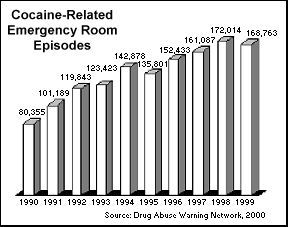Crack Addiction
Crack addiction is a process that is both rapid and severe. Those who believe that their "recreational" use is under control are not immune from the threat of addiction. Clinicians estimate that 10 percent of recreational users will go on to serious, heavy use of cocaine. According to the 2001 National Household Survey on Drug Abuse, approximately 6.2 million (2.8 percent) Americans age 12 or older had tried crack at least once in their lifetime, 1.0 million (0.5 percent) used crack in the past year, and 406,000 (0.2 percent) reported use in the past month. Users who become addicted will "crave" more of the drug as soon as the intoxicating effects wear off, if they do not get their regular dose. Abusers may have a hard time limiting their use and may build a tolerance to the drug, requiring larger amounts to get the same desired effect. They may develop problems with schools, jobs, and personal relationships. Addicts have to support expensive habits, which can cause them to quickly turn to a life of crime: shoplifting, theft, drug dealing, and prostitution. During FY 2000, the DEA made 8,718 arrests involving powder cocaine and 6,734 arrests involving crack. More than 3,000 of those arrested by the DEA for crack-related offenses were between the ages of 21 and 30.
Benzoylecognine,
a metabolite unique to both cocaine and crack can be detected in urine anywhere
from two to four days. The disruption to brain chemistry due to crack addiction
remains much longer. The urge to use continues long after the dependent individual
stops abusing. This may make recovery difficult, but not impossible.




